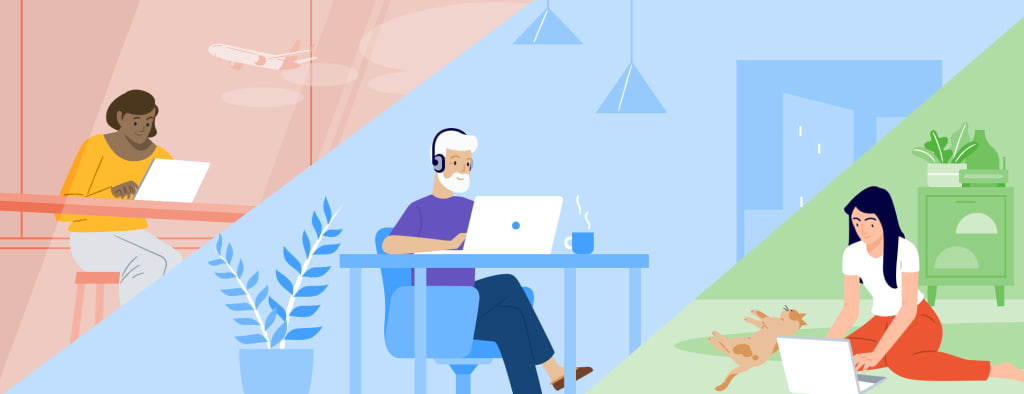How A Pandemic Reshaped Our Modern Working World
The Impact of Remote Work on Productivity, Commuting, and City Dynamics

As we continue to recover from the disruption the COVID-19 pandemic caused our lives, many of us have transitioned from traditional office spaces to makeshift workstations at home. While this shift has been prompted by unwelcome circumstances, it has also brought about several benefits. From a more content and motivated workforce to increased productivity and efficiency, remote work has proven its potential. As we look ahead, the question arises: Will our workday ever be the same again?
The Commute Conundrum:
Commuting has long been a source of stress and dissatisfaction for professionals worldwide. Lengthy commutes not only consume valuable time but also impact our overall well-being. Studies have shown that extended commuting distances increase the risk of relationship strain and have detrimental effects on physical health. With the pandemic forcing remote work, we have witnessed a reduction in commuting time, allowing for more quality time with family and personal activities.
The Rise of Flexible Working:
Flexible working arrangements were gaining popularity even before the pandemic struck. However, there has been some resistance from managers who fear a loss of control and potential challenges in managing remote teams. Contrary to these concerns, research suggests that flexible work can boost productivity and employee satisfaction. With the ability to set their own schedules and work from home, individuals experience greater autonomy and a better work-life balance.
The Productivity Paradox:
Studies have shown mixed results when it comes to remote work and productivity. While a two-year Stanford study revealed a 13% increase in productivity among employees working from home, other surveys indicate varied outcomes. Factors such as a lack of dedicated workspace or difficulty maintaining a work mindset may impact productivity levels. Nonetheless, organizations that effectively manage flexible work arrangements can reap significant benefits, including increased productivity and reduced employee turnover.
A Hybrid Future:
The pandemic has prompted a reevaluation of traditional work setups. Rather than a complete shift to remote work or a return to the office, a hybrid approach seems to be emerging as a potential solution. This model combines the flexibility of remote work for individual tasks with in-person collaboration and team meetings at the office. Such a hybrid style allows for a balance between personal space and social interaction, catering to the diverse needs of employees.
Transforming Urban Dynamics:
The changing nature of work has also influenced urban living patterns. With remote work becoming more prevalent, professionals are reevaluating their living arrangements. Some have chosen to move away from crowded cities in search of more spacious and green environments. This shift may lead to the emergence of polycentric cities, where work, recreation, and social life are distributed across multiple locations. The concept of the "15-minute city," where daily necessities are easily accessible by foot or bike, gains prominence as commuting distances become less significant.
Redefining Our Cities:
The transformation of work dynamics presents an opportunity to reimagine our cities. With reduced reliance on private cars, there is potential to repurpose street infrastructure for better mobility and distribution. Pedestrian-friendly spaces, improved public transportation, and innovative delivery systems can enhance urban livability and create more equitable access to services. Additionally, the pandemic has highlighted the importance of supporting essential workers and ensuring their access to vital resources.
Embracing a New Work Paradigm:
The pandemic has accelerated the adoption of remote work and forced us to reconsider traditional office-based norms. As we navigate this period of change, companies are exploring alternatives to central offices, such as sponsored co-working spaces closer to employees' homes. The newfound confidence in the efficiency of remote work may lead to a range of new work models and opportunities.
The COVID-19 pandemic has disrupted the way we work and live, prompting a reimagining of traditional office environments and urban dynamics. Remote work has proven its potential, offering benefits such as increased productivity and improved work-life balance. As we move forward, a hybrid work model that combines remote work with in-person collaboration may become the new norm. This shift has implications for our cities as well, as urban living patterns evolve and new concepts of accessibility and mobility emerge. By embracing these changes, we have the opportunity to shape a future that prioritizes flexibility, well-being, and sustainable urban development.
About the Creator
Conor McKernan
An ecletic reader who writes about everything






Comments
Conor McKernan is not accepting comments at the moment
Want to show your support? Send them a one-off tip.